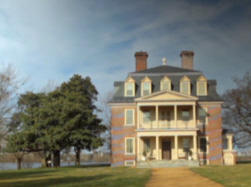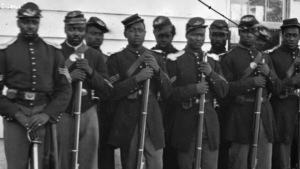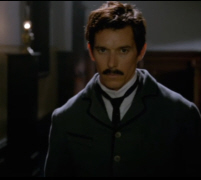The Confederacy would be the new Slave Union
At exactly the same time, a remarkably similar problem was tearing America apart. Here, too, a rural underclass lived alongside the modern industrial world. The nation that had been built on the ideals of liberty and equality was polluted by a system even worse than serfdom.. slavery.
In the mid-1800s, there were around 4 million slaves in the United States, almost all of them in the south, working on plantations like this, growing cotton and tobacco and much else. Economically, slavery was a dynamic and efficient system, and as America started to spread towards the West, the southern states wanted to see slavery spreading too.
Abraham Lincoln
But in the North, where many states had banned slavery, they thought very differently. They were determined that slavery would not grow. America was split down the middle. Things came to a head in 1860, when the northerner Abraham Lincoln became president. Lincoln believed that slavery was wrong, but he also said that he had no intention of abolishing it, hoping instead it would die out over time.
But southern politicians realised that Lincoln’s arrival in the White House meant slavery would not now spread further, as they had hoped.
11 southern states decided to break away from the union and establish an independent government - the Confederacy.

Lincoln had no choice but to declare war on the south to defend the union. This was a struggle between two different ways of life. In the south, it was an agricultural society - traditional, conservative, many people living on plantations which were virtually self-sufficient, cut off from the rest of the world. “Yes,” said the North, “but all your wealth depends on slavery”. In the North - urban, industrial America, based on steel and railroads and a rising middle class. “Ah, yes,” said the south “whose prosperity is based on wage slaves”.
So, two Americas, now no longer able to properly speak to each other.
On April 12, 1861, these two Americas duly went to war. Lincoln mobilised the North’s industrial might, using railways to transport men and munitions. But to start with, it went badly for him. The South had better Generals and a bolder fighting spirit.
After 18 months, Lincoln was desperate. He decided to destroy the foundation on which the south was built. He’d free the slaves.

“We must free the slaves, he said, “or be ourselves subdued”. He hoped this would destroy the southern economy and demoralise the people. And so, on New Year’s Day, 1863, just two years after the Russians had announced the emancipation of the serfs, Lincoln announced his Emancipation Proclamation - that all the slaves in the rebel states would immediately be free.
Liberated slaves flocked to fight with the Northern forces.. While the South struggled with shortages and inflation. The tide of war turned in the North’s favour. On April 9, 1865, after a devastating invasion, the south surrendered.
620,000 soldiers had been killed. Nearly as many as in every other war the United States had fought put together. In the final days of the war, Lincoln did something extraordinary. He simply turned up at the Confederate rebel capital of Richmond, Virginia, not very far from Washington.

His troops had just taken it, it was still burning. No-one had any idea what to expect when he arrived here by boat at Rocketts landing. There was a huge crowd, entirely black. Lincoln had the most recognisable face in America and he was spotted immediately. There were cries of “Our Messiah!” And “Jesus Christ!”
One man knelt to him, and Lincoln said, “No, no you only kneel to your God.”
And then the group started to walk the two miles into the centre of Richmond, and gradually there were more and more white faces in the crowd. Sullen, silent, staring back from windows and the tops of buildings. The people that he had just defeated. And Lincoln’s group were expecting shouts of abuse, possibly even shots. Nothing. And at that moment, it seemed as if Abraham Lincoln had won all of America back.
10 days after Richmond, Lincoln went to the theatre in Washington. He hadn’t been keen, but his wife had begged him to come. A night off for the hero.

But the defeated South would inflict one last act of bloodshed. A second-rate actor and southern Confederate supporter called John Wilkes Booth saw Lincoln as a tyrant. The actor Booth was about to make his final appearance. And he knew the reviews would be mixed.
Booth cried out the Latin motto of the state of Virginia, as he jumped from the balcony after shooting the President. “Sic semper tyrannis!”, “Thus always to tyrants”.
The North mourned an immortal political hero. In the south, they celebrated. One Texan newspaper professed itself “thrilled by the death of our oppressor”.
The American Civil War left a bitter legacy. In the south, burned and devastated, the whites remained very angry about what had happened, and black Americans faced many, many decades of grinding rural poverty, segregation laws and lynchings for those who stepped out of line. But the union was preserved. And in the North, this extraordinarily industrious, vigourous economy, now linked together by a railroads, stormed ahead - the American Colossus striding towards the 20th century.
Freed of its slave economy, the United States rushed to modernise. For the first time, Americans began to impose themselves around the world. Already, they were looking West, across the Pacific.
